Fuses and circuit breakers are an absolutely integral part of any electrical system, whether it’s in a house or a car, they are essential to avoid damage to other electrical components and, more importantly, protect any users from the risks of electrocution and injury.
Below, we take a look at the most common types of fuse and circuit breaker found in UK homes and the ways in which they are used.
Safety Information When Working With Electricity
As it’s drummed into all of us from a your age, electricity is extremely dangerous and if not treated carefully, it can lead to serious injury and even worse! So with this in mind, if you don’t know what you’re doing, leave it alone!
When it comes to what you can actually do yourself, this is very limited and pretty much stops at changing existing socket and switch faceplates. However if more in depth work is required then this can and should only be done by a Part P registered electrician with the necessary skills and knowledge to do the work to regulations standards, plus fully test all work once completed and issue a certificate.
If these rules are not followed then in almost all cases this will invalidate your home insurance, if you are unable to present a certificate for a given set of works. This can also cause issues if you try to sell your home!
For any jobs you can do, make absolutely sure you have isolated any circuit you are working on – for help with this and other safety tips see our electrical safety project.
One final point worth mentioning – a while back the existing UK wire colours were changed to harmonise with those used in Europe and to find out all about this, see our wire colours project here.
What is a Fuse?
A fuse is essentially an electrical safety device that helps to preserve an electrical circuit by providing overcurrent protection so that in the event it received too much current, it blows instantly cutting the power to conserve the circuit and also protect any and all from injury.
In a domestic setting, unless there is an issue with a given electrical device or circuit, this is about the only time when you may come into contact with a fuse and in these situations it’s either going to be the cartridge fuse in a plug or the MCB in your consumer unit.
These 2 cover 2 out of the 3 different fuses you are likely to encounter in your home; the electromechanical MCB that trips when an issue is detected, the cartridge fuse with wire between 2 points that melts with too much current and the rewirable fuse found in older-style fuse boxes that, as it sounds, is replaced once the issue has been resolved.
MCB’s and RCD’s in a Consumer Unit
As commented above, one of the main locations of fuses in the home is the consumer unit. Although they aren’t typically what you might picture in your minds eye when someone mentions a fuse, they work in pretty much the same way. If an overcurrent issue is detected a switch is flicked and the power is cut.
Traditionally the main types of fuse found in a consumer unit was the MCB and the RCD. Essentially an MCB protects only 1 single circuit within your consumer unit and every circuit that features has its own.
RCD’s on the other hand generally cover and protect several MCB’s and in some cases the whole consumer unit.
With early consumer units, generally only 1 RCD was featured next to the main switch and this would protect all of the MCB’s below it, but in the event of an issue it would cut power to the whole unit, which isn’t ideal.
With the more modern split load consumer units, the board was broken into 2 parts by 2 separate RCD’s. If an issue was detected on one bank then the RCD would cut the power, however the other would still remain live so you didn’t loose all the power in your home.
Also, those circuits which need more protection than others, i.e. showers, sockets serving outdoor appliances, external 240V lighting, must be protected by an RCD. All other circuits such as lighting and cookers etc. as said, have their own MCB.
If you would like to learn more about consumer units and how they work, see our project on consumer units here for more information on this.
Types of Fuses and Circuit Breakers
When it comes to the different types of fuses, there is indeed quite a few from specialist industrial fuses to automotive fuses, however as we are only concerned in this guide with domestic fuses this essentially cuts the list to the 2 main types; AC fuses and DC fuses.
With this in mind, again as we are dealing with UK domestic electricity, due to the nature of many appliances used in UK homes this is confined to AC only so here follows the main types of domestic fuses and circuit breakers of this type.
The MCB – Miniature Circuit Breaker
An MCB, or Miniature Circuit Breaker as it’s known is a form of modern fuse (protective device) used in consumer units which overcomes the traditional problem associated with re-wirable fuses in so much as when one blows you don’t physically need to replace the fuse wire.
In simple terms, a MCB is just a switch that, when it senses an overload, short circuit or any other overcurrent issue, it simply trips and turns itself off, isolating the power and any risk of fire or injury.
When used in a consumer unit, every single circuit featured will have it’s own MCB (or RCBO if these are used instead) as the regulations state that each circuit should have it’s own individual MCB for protection.
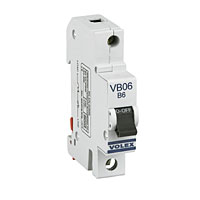
MCB – Miniature Circuit Breaker
The RCD – Residual Current Device
An RCD is a similar protective device to an MCB, however it has some more in-built safety features. Firstly it is connected to both the live and neutral wires in the consumer unit making it a double pole switch, whereas the MCB is only connected to the live side of the circuit.
Secondly, rather than just detecting an overload of current, it also detects earth faults and residual current issues, essentially the fault which causes the overload.
Also, as opposed to simply just protecting 1 single circuit they protect a number of circuits and although these are individually protected themselves by their own MCB they provide an additional layer of protection over just this.
Traditionally in a consumer unit there would be a main power switch for the whole board and then beneath this a RCD covering all of the MCB’s/fuses. In this setup, if an issue was detected, it would isolate power to the entire board, not ideal!
To resolve this issue the split load consumer unit was introduced and this had 2 RCD’s that each protected half the featured circuits and MCB’s. In the event of an issue, only the RCD protecting that circuit would trip so you would still have half the circuits still working.
This meant that you would still have power to the remaining circuits and wouldn’t be without until the issue has been resolved.
One further point to make is that any circuit that’s supplying an electrical outlet in a kitchen, bathroom or outdoors must be protected by an RCD!
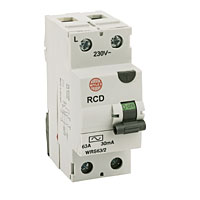
RCD – Residual Current Device
The RCBO – Residual Current Circuit Breaker with Overload Protection
The RCBO is a fairly modern innovation and combines the best features of both an MCB and RCD into one single unit.
Aside form just protecting from overload and over current, it also protects against short circuit and earth leakage, a much more comprehensive protection device.
Another great feature is that as it incorporates the abilities of an RCD and MCB you can use them to protect an individual circuit on their own, without the need to also feature an RCD.
This in turn also helps to overcome the “unwanted tripping” rule that was introduced in BS7671: 2018 Wiring Regulations. This point stated that when RCD’s trip, whether there’s only one or a split-load board, this can be very annoying, especially if there isn’t really an issue and it’s only down to the fact that the wrong appliances are plugged into the circuit and this has caused too much earth leakage, which can occur with some power-hungry appliances.
As the RCBO has MCB and RCD features, as stated, you don’t need an RCD to protect it and thus avoid any nuisance tripping issues.
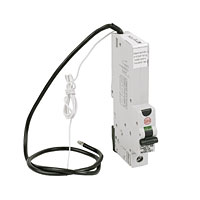
Residual Current Circuit Breaker with Overload Protection
RCD Plugs and Socket Adaptors
As we have stated above, any outdoor socket by law must be protected by an RCD, however for total safety for any electrical appliances outdoors you can fit an RCD plug.
What this is, is a standard plug with an RCD built into it and in the event that you accidentally damage the power cord or similar to the item you’re using, the plug with instantly trip and cut the power, often before the one in your fuse box trips.
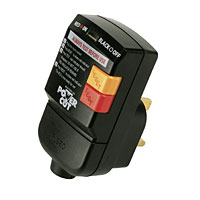
RCD plug adaptor
Another, and in all honesty, better solution is to use an RCD socket. This works in exactly the same way only instead of just being wired to one appliance it sits between a standard wall socket and the item being powered, allowing you to protect a range of devices, essentially anything that’s plugged into it.
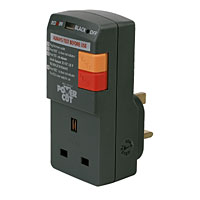
RCD socket adaptor
Cartridge Fuse Sockets and Fused Connection Units
Both of these power supplies utilise a standard cartridge fuse, as used in a normal 3-pin plug as an additional safety means.
On the front of the fused connection unit or FCU as it’s known or fused socket there will be a small pull out or flip open drawer that will contain, normally a 13 amp fuse, but will depend on what’s being powered, that protects the socket or FCU and what ever is running off of it.
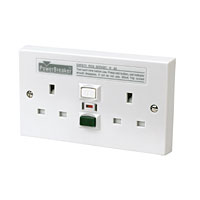
Re-wireable/cartridge fuse socket
In the event that an overcurrent issues occurs, the fuse blows and cuts off the power to any items connected to the FCU or the plug, protecting them from damage and also you from any risk or electric shock.
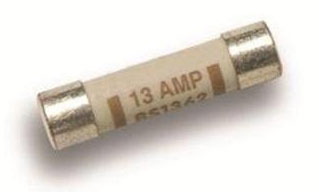
Standard 13 amp domestic cartridge fuse
To enable the socket or FCU once more you simply replace the fuse with a new one of equal amperage and it’s good to go again.
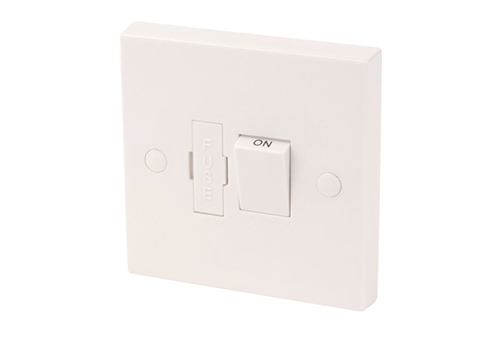
Fused connection unit or FCU
Re-Wireable Fuses
Re-wirable fuses are now somewhat of an old, pretty much obsolete form of fuse found in an old-style fuse box. Due to changes with the regulations, old fuse boxes should now be replaced with a more modern, efficient and safer consumer unit, however quite a few homes in the UK that haven’t had their electrical systems updated still have them.
The re-wirable fuse effectively performs the same job as an MCB. In the event it detects and over current issue it blows and cuts the power. However unlike an MCB there is no switch, only a piece of fuse wire between 2 terminals. When an issue occurs, the fuse wire melts and cuts the power.
Once the issue has been resolved, the fuse wire is then replaced by the same grade of wire and the fuse replaced re-enabling the power.
Although this system is fairly simple and straight forward, it does rely on the fact that the correct fuse wire is used when it’s replaced, which is absolutely essential to ensure the circuit remains safe from overload and fire.
Also, for anyone that has ever has to rewire one of these fuses late at night in the dark because the lighting circuit has tripped will know that their demise is only all too welcome.
So, if you still have one of these in your home it may very well need replacing with a much safer consumer unit. To find out contact a local electrician and get an EICR (Electrical Installation Condition Report) done and this will tell you if it needs replacing.
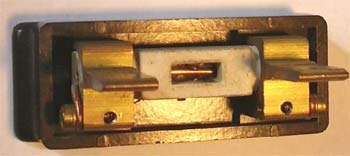
Re-wireable fuse
In pretty much all cases, at some point you will come in to contact with one type of fuse mentioned above and if it’s due to an issue then before replacing it, it is essential that you get the issue resolved as if it isn’t then the fuse or MCB will simply trip once more.

